A smart scale simplifies weight tracking by recording readings and either storing them in the scale or transmitting them to an app. After logging hundreds of weigh-ins on various smart scales over six years, we confidently recommend the Wyze Scale X. Its reliability and incredibly simple app make it the top choice for effortless and accurate weight monitoring.
How we picked
Consistent weight readings
We searched for scales with reliable readings of weighted objects and body weight.
App experience
A smart scale should have good connectivity to an easily navigable app, one that preferably shows data automatically.

Wyze Scale X
The best smart scale
This durable scale provides consistently accurate readings, accommodates up to eight users, and has an easily navigable, if somewhat basic, app.
The Wyze Scale X is affordable and accurate, and it has the longest battery life of any model we tested that uses replaceable batteries (it comes with four AAA batteries, which you can expect to last 22 months). This scale sends data via Bluetooth to a clean app that’s fairly intuitive from first use. It’s also compatible with other major health apps, including Apple Health and Google Fit.
Eufy Smart Scale P2 Pro
Solid scale, immersive app experience
This scale’s informative (and fun) app and capacity for an unlimited number of users set it apart. But in our testing, it wasn’t as consistently accurate as our pick.
Combining numerical and visual data, the Eufy Smart Scale P2 Pro has one of the most fun apps we’ve seen for a smart scale that’s both Bluetooth- and Wi-Fi–compatible. Unlike most other smart scales, the Smart Scale P2 Pro does not limit the number of users it can store information for. And its readings are regularly accurate (though less consistently so when compared with those of our top pick). This scale has a longer warranty than our pick (15 months versus 12 months), but it requires more-frequent battery replacement (every six months versus 22). And the Smart Scale P2 Pro normally costs almost twice as much as the Scale X.
The research
Why you should trust us
Who this is for
How we picked and tested
Our pick: Wyze Scale X
Runner-up pick: Eufy Smart Scale P2 Pro
Other good smart scales
The competition
Sources
Why you should trust us
To find the best smart scale, we interviewed health, fitness, and cybersecurity experts. We read dozens of reviews of highly rated products and took into account long-term testing notes from Walletrays. Fitness staff writer Seth Berkman has used a variety of bathroom scales and health apps for over a decade. Seth is an author of our guides to treadmills and running shoes.
Who this is for
Body weight fluctuates daily. Because they automatically log weigh-ins, smart scales and their apps simplify the task of monitoring changes in your weight over time. Experts say these scales are valuable tools for anyone looking to track weight loss, weight gain, or weight maintenance. (If you’re not interested in automated weight tracking, we have recommendations for standard bathroom scales, too.)
Experts are mixed on how often you should weigh yourself. “Over long periods of time, it’s an excellent indicator of your lifestyle, how much you’re eating, and how much you’re expending,” said Cornell University’s David Levitsky, who for four decades has studied food intake and body-weight regulation, and who recommends daily weigh-ins.
Karen Glanz, whose research at the University of Pennsylvania has often focused on obesity and nutrition, noted that opinions on daily weigh-ins have changed over the years. “Experts used to say don’t weigh yourself every day because it will affect your mood, how you feel, and weight, per se, doesn’t go in a straight line day by day,” Glanz said. She added that some recent studies “have also shown people who weigh themselves regularly, often every day, tend to be more successful in losing weight.”
Several experts we’ve spoken with over the years said they would not recommend daily weigh-ins for anyone who has an eating disorder.
Smart-scale makers typically do not recommend that people who are pregnant or who have a pacemaker or defibrillator use their products, due to safety and accuracy concerns. That’s because most smart scales use bioelectrical impedance analysis (BIA); this sends a small current through your bare feet (one you can’t feel) to try to estimate body fat, muscle mass, water weight, and more. Cornell’s Levitsky said wearing socks can deactivate the BIA, but some smart scales, including our top pick, also offer a mode that renders the BIA inoperative. Speak with your doctor if you have questions or concerns about your weight or about using a smart scale.
As with any device that connects to the internet (and collects potentially sensitive, personal health-related information), there are privacy and security issues to consider, such as whether and how your data may be shared. With each weigh-in, smart scales collect a tremendous amount of personal data, including stats that most people don’t want shared without their consent. Such information does not fall under HIPAA confidentiality protections (as health data from a visit to the doctor does). Keep in mind that if you choose to connect the data collected from your scale with third parties, such as Apple Health, Fitbit, and Google Health, you must also rely on those companies to keep your data secure.
How we picked and tested

Since 2017, we’ve tested 33 smart bathroom scales and their accompanying apps. We’ve found that the apps often matter as much as the hardware. We’ve also discovered that the experience can be highly dependent on the way the scales connect wirelessly.
A majority of the experts we consulted over the years have recommended smart scales that transmit data via Bluetooth, versus those that send information over Wi-Fi only. If a smart scale and its app have connectivity issues, sometimes that can result in data loss. “We’ve noticed a real difference in how Bluetooth scales tend to be more user-friendly,” said Lisa Quintiliani, co-director of the Mobile and Electronic Health Affinity Research Collaborative at Boston University. In six years of testing dozens of scales for this guide, we’ve consistently prioritized Bluetooth connectivity, viewing a scale’s ability to transmit data via Wi-Fi (in addition to Bluetooth) as nice to have but not a necessity.
We tested each scale for several days in a row, for consistency. And we tested them on flat surfaces; nursing professor Karen Glanz noted that tilted floors, carpets, or bumpy surfaces can slightly throw off readings. In two tests, we compared the weight registered on each scale with our weight from a medical scale, as well as how accurately a scale measured dumbbell weights of 30 and 50 pounds. We also weighed ourselves daily on each scale for a week, to check that it didn’t repeat the same weight from memory.
When evaluating each scale, we also considered:
- Overall utility: We prioritized models with easy-to-read measurements on a digital display.
- Consistency: Like any bathroom scale, a smart scale should provide a weight measurement you can trust. Most of the experts we spoke with agreed that many home scales don’t provide as accurate a measurement as you can find at a doctor’s office. They said consistency is more important than pinpoint accuracy, however.
- Connectivity: We also noted if an app failed to connect via Wi-Fi or Bluetooth, or if it failed to register a weight from its associated scale.
- App experience: We observed whether apps were easy to navigate, whether they provided easy-to-understand information, and whether data registered automatically or had to be entered manually.
- App compatibility: We looked for scales that are compatible with Apple Health, Google Fit, and other major health apps, and we sought those that easily and reliably connect to them.
- Data privacy: We read through the privacy policies and terms of use for each app, and we followed up with the makers of our picks, questioning how they collect, store, and share customer data. We also looked at how scales manage privacy within the app, since all of the smart scales we considered can be used by more than one person.
We did not consider metrics other than weight. Many smart scales purport to measure or estimate more than weight. Some are said to assess body fat, body mass index (BMI), water, muscle mass, and more. But smart scales for home use are rarely accurate on all of these additional measurements, according to experts we spoke with, and our own use of smart scales revealed plenty of inconsistencies. One scale’s app said a 41-year-old tester’s metabolic age was 43, while another scale’s app said it was 38, for example. We focused our testing on evaluating only the most important metric: weight. “Unless you want to be an Olympic-type athlete, your composition’s going to stay relatively constant,” Levitsky said of these additional metrics. “It’s a nice selling point for the scales, but it’s a very poor measure of [body] composition.”
Our pick: Wyze Scale X
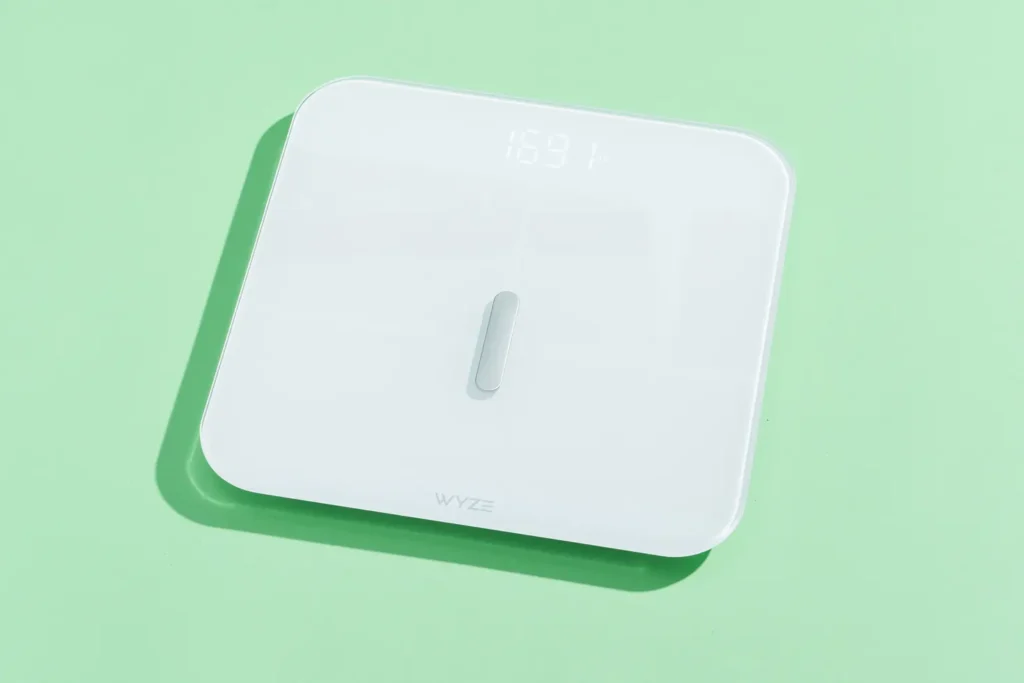

Wyze Scale X
Top best smart scale
This durable scale provides consistently accurate readings, accommodates up to eight users, and has an easily navigable, if somewhat basic, app.
The Wyze Scale X was among the most accurate scales during testing, providing consistent and fresh readings at nearly every weigh-in. It has a sturdy, durable platform, and its app makes long-term tracking of health goals relatively simple. The company’s commitment to security is extremely disappointing, though there have not been any concerns specifically about data from its smart scales.
It has solid specs and a relatively long battery life. The Scale X has a listed capacity of 400 pounds, can store up to eight user profiles, and is compatible with Apple Health, Google Fit, and Fitbit. It measures 12 by 12 inches and weighs 4.07 pounds. And it comes with four AAA batteries (intended to last 22 months) and has a one-year warranty.
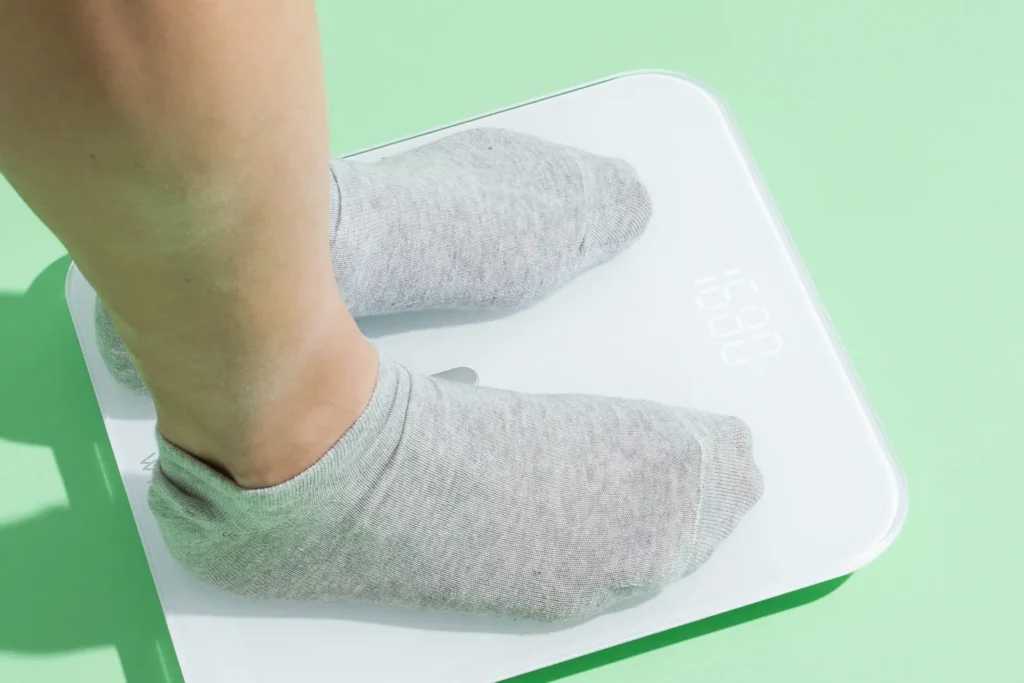
It’s accurate and consistent. In our weight tests, the Scale X perfectly measured a 30-pound weight and was 0.1 pound off when measuring a 50-pound weight. Compared with our weight registered on a medical scale, on this scale our body weight was off by only 0.3 pound.
The app is informative and customizable. The Wyze app lets you set goals and see trends in weight over a week or years. And with a tap of a button, it can enable special scale measurement modes for babies, pets, and luggage. You can also rearrange the display of measurements, prioritizing, say, weight over muscle mass or metabolic age (two of the many metrics experts are skeptical of).
The company says personal data is encrypted and not shared with third parties. Along with 13 biometric measurements, including weight, body fat percentage, and BMI, the Wyze app collects personal information, such as email address, biological sex, age, and height. Wyze said data is encrypted in transit and at rest, where it’s anonymized and access is controlled. The company also said it does not share user data with any third party.
The Wyze Scale S is a somewhat smaller, lighter version of this scale. The Scale S regularly costs around $10 less than the Scale X. But in our testing, we found the Scale X to be more consistently accurate. We also preferred the Scale X’s larger platform.
Flaws but not dealbreakers
In February 2024, The Verge reported that Wyze security cameras were able to access images from other users’ cameras. This follows a similar incident from September 2023. As a result of the company’s pattern of security flubs with smart cameras, we have paused recommending Wyze Smart Home products.
“There are no known security issues with our scales, past or present,” a company spokesperson told us after the September incident, when we asked if there had been any similar breaches with the Wyze Scale X. We will continue to closely monitor any security and data privacy concerns that may arise with the Scale X.
The Scale X is our only pick that does not offer direct heart-rate readings from your bare feet (which, as with all other non-weight biometrics, we did not test). Instead, the app provides a reading when you place your fingertip on your phone camera. However, experts have told us that devices specifically created for measuring heart rate are superior. “A wrist monitor, chest strap, or a mobile device like KardiaMobile are much better ways to accurately assess heart rate,” Karen Glanz said.
Runner-up pick: Eufy Smart Scale P2 Pro
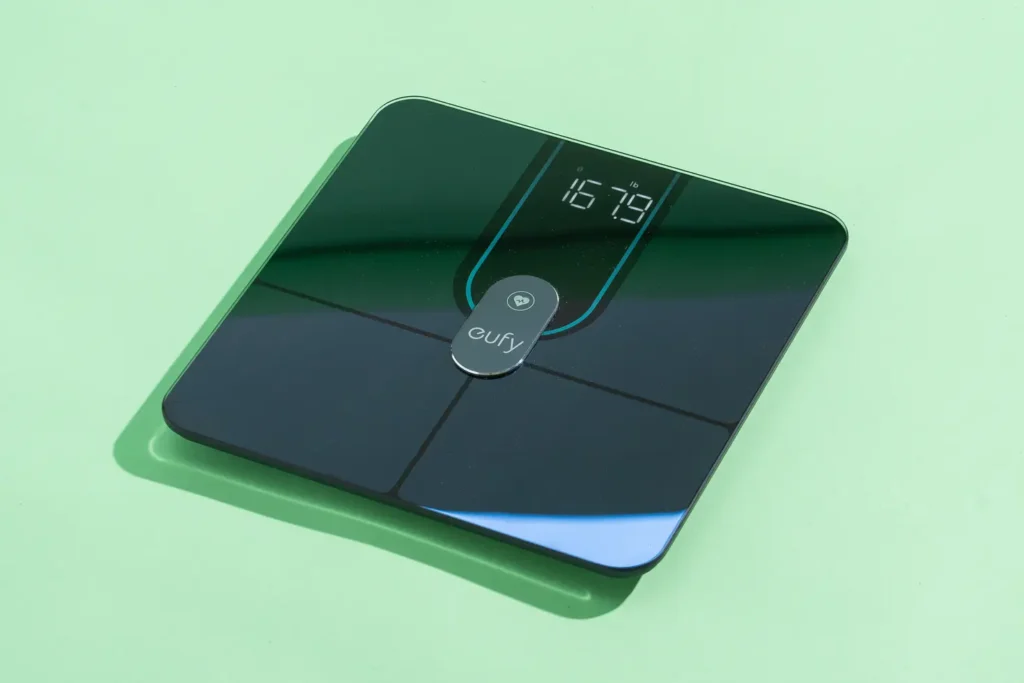

Eufy Smart Scale P2 Pro
Solid scale, immersive app experience
This scale’s informative (and fun) app and capacity for an unlimited number of users set it apart. But in our testing, it wasn’t as consistently accurate as our pick.
You save $35 (47%)
The Eufy Smart Scale P2 Pro was mostly accurate and consistent in its weight measurements, and it has a more-interactive app than our top pick. Unlike the Wyze Scale X and most of the other smart scales we tested, this scale has an IPX5 water-resistant rating. So low-pressured water streams, like from shower spillover or a home tap, won’t affect its readings. It also has a 15-month warranty, which is a bit longer than our top pick’s warranty, but the Smart Scale P2 Pro typically costs more than twice as much.
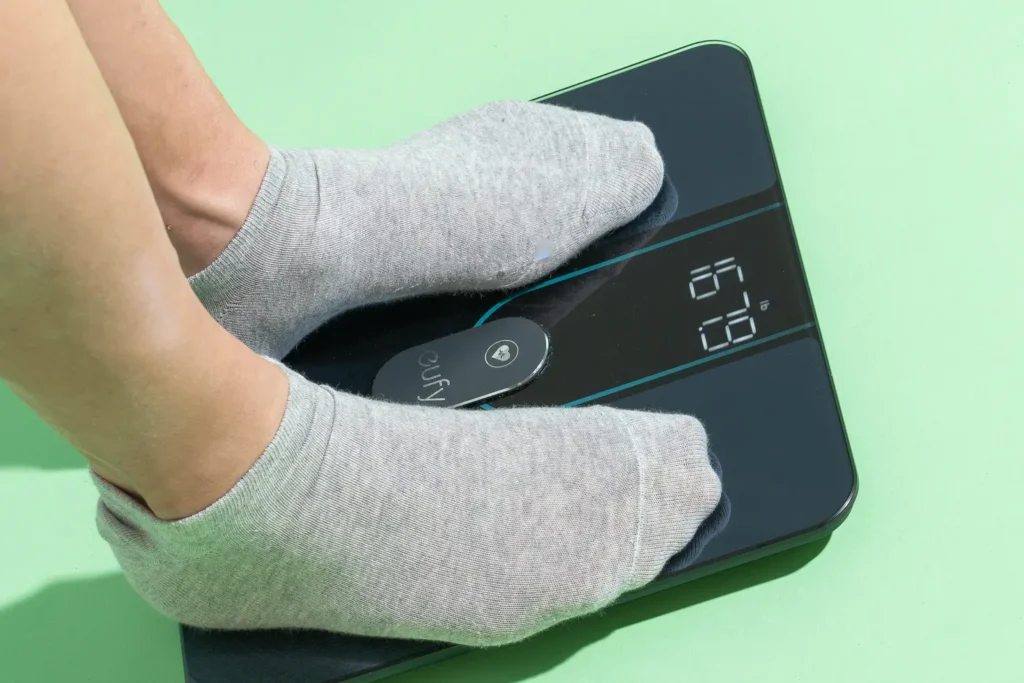
The display on the Eufy Smart Scale P2 Pro presents clearer readouts than our top pick, but overall the scale (11 by 11 inches) is smaller than the Wyze scale.
It’s smaller and less consistently accurate than our top pick—but still good. In most of our weight tests, the 2.93-pound Smart Scale P2 Pro was only slightly off from our top pick, notably coming in half a pound off from a body-weight measurement taken from a medical scale. Its weight capacity is 397 pounds (our top pick’s is 400). But this scale’s footprint (measuring 11 by 11 inches) is noticeably smaller than that of other smart scales; this could be a hindrance for those with larger bodies. The Smart Scale P2 Pro has modes to measure weights for pets and babies but not luggage.
Its app is more engaging. The Eufy app is interactive and, dare we say, fun to use, with a layout that displays more than just numbers. You can set goals and see a visual representation of body changes through a customizable avatar, as well as graphs for daily, weekly, and monthly changes. Readings also judge whether you are in a low, standard, or high weight range for your height and age, and they give tips on how to improve your metrics through certain dietary habits or exercises. Like our pick, the Smart Scale P2 Pro is compatible with Apple Health, Google Fit, and Fitbit. A tape measure is also included with the scale (for analog measurements).
It requires more-frequent battery replacement. The Smart Scale P2 Pro includes four batteries, but they last just six months (versus our top pick’s stated 22 months).
The company told us that user data is encrypted in transit and storage, but not at rest. The Eufy scale and app collect data on 16 biometric measurements, including weight, heart rate, and BMI, as well as personal information including general geographic location, email address, biological sex, age, and height. The company said data is encrypted in transit and storage, and it is desensitized but not encrypted at rest. Eufy said it does not share users’ data with any third parties.
Like Wyze, Eufy has encountered privacy issues with some of its non-scale products. In January 2023, Eufy confirmed to The Verge that its advertised always-encrypted cameras produced some unencrypted streams. A company spokesperson said Eufy will continue to update its privacy policy as more enhancements are made to its system and processes.
Readers also like

Top Best Bathroom Scales
Most scales under $50 have significant drawbacks, but the EatSmart Precision+ Ultra-Wide Bathroom Scale has proved reliable over years of long-term testing.
Other good smart scales

Photo: Marki Williams If you want to set athletic goals or use Flexible Spending Account (FSA) funds: Consider the Withings Body Smart (currently $100, Bluetooth and Wi-Fi). It has a weight limit of 440 pounds, and its app is easier to use than our top pick’s. Unlike both of our picks, this scale is FSA-eligible. Within the app, you can set weight goals and invite friends to challenges, such as steps taken during a week. Like our top pick, the Withings Body Smart scale has a specific mode that turns BIA off, and it has an “eyes-closed mode,” which gives you motivating messages instead of weight readings. It comes with a two-year warranty.
If you want an ultra-accurate smart scale with a notably high weight limit: The A&D Medical Premium Wireless scale (currently $85, Bluetooth only) was the most consistently accurate scale in our testing, and it has a 450-pound weight limit, which is higher than those of our picks. Somewhat annoyingly, though, its app requires you to manually confirm your weight and then enter your height every time you record a reading from the scale—effectively invalidating some degree of automation. The scale is compatible with Google Fit and Apple Health. This scale is FSA-eligible with a letter of medical necessity from a physician, and it has a two-year warranty.
The competition
With the Fitbit Aria Air, you need to have the Fitbit app open in order to transmit data from the scale, and it’s not compatible with Apple Health.
The Garmin Index and Index S2 are both more expensive than any model we tested. Several customer reviews have highlighted accuracy concerns with both scales.
During setup, we had difficulty connecting the Greater Goods Premium Bluetooth Smart Scale to its accompanying app, and several online reviews mention similar troubles over time. Then, when we set the scale to read in pounds, it switched over to kilograms. The scale has a clear digital display, connects to a bevy of fitness apps, and has a maximum weight of 400 pounds. But in our weight tests, this scale underperformed compared with our picks.
The Omron Body Composition Monitor and Scale BCM500 has the lowest maximum user weight (330 pounds) of all the models we tested. It allows for four user profiles—half of what several other models accommodate. We found its weight readings to be middle-of-the-road, and the app had a simple and basic layout.
The QardioBase X Smart Body Composition Scale was noticeably heavier than our other scales; it’s listed as weighing 6.6 pounds. And that didn’t lead to more-accurate measurements: During our dumbbell weight tests, this scale was, on average, off by 0.4 pound, among the least accurate measurements of any scale in our lineup on those particular tests. We did like that it has Bluetooth and Wi-Fi capabilities and a rechargeable battery that’s advertised as lasting 12 months per charge. The app is pretty basic; it’s easy to read but with no standout features.
On the surface, the Withings Body+ scale is not all that different from the FSA-eligible Withings Body Smart scale that we like. It is Bluetooth- and Wi-Fi–compatible, and it can be connected to major health apps, such as Apple Health, Google Fit, and Fitbit (as well as to over 100 other apps, according to Withings). It accommodates eight users and has a two-year warranty. But in our weight tests, we found that the Body Smart scale performed slightly better, and it has a higher maximum weight (440 pounds versus 396 pounds for the Body+). Also, the Body+ scale lacks a color screen. It regularly took longer for a weight to register on the Body+, with the reading fluctuating by half a pound (up or down) several times before landing on a number. If you choose to take stock in advertised advanced metrics, the Body Smart scale also has more features, like advanced body composition and basal metabolic rate readings.
Nancy Redd, Rachel Cericola, Shannon Palus, and Melanie Pinola contributed reporting.
This article was edited by Tracy Vence and Kalee Thompson.
Sources
1- Lisa Quintiliani, PhD, associate professor of medicine, Boston University Chobanian & Avedisian School of Medicine, Zoom interview, September 23, 2022
2- David Levitsky, PhD, professor emeritus, division of nutritional sciences, Cornell University, Zoom interview, June 28, 2023
3- Karen Glanz, PhD, George A. Weiss University Professor at the Perelman School of Medicine and the School of Nursing at the University of Pennsylvania, Zoom interview, August 9, 2023

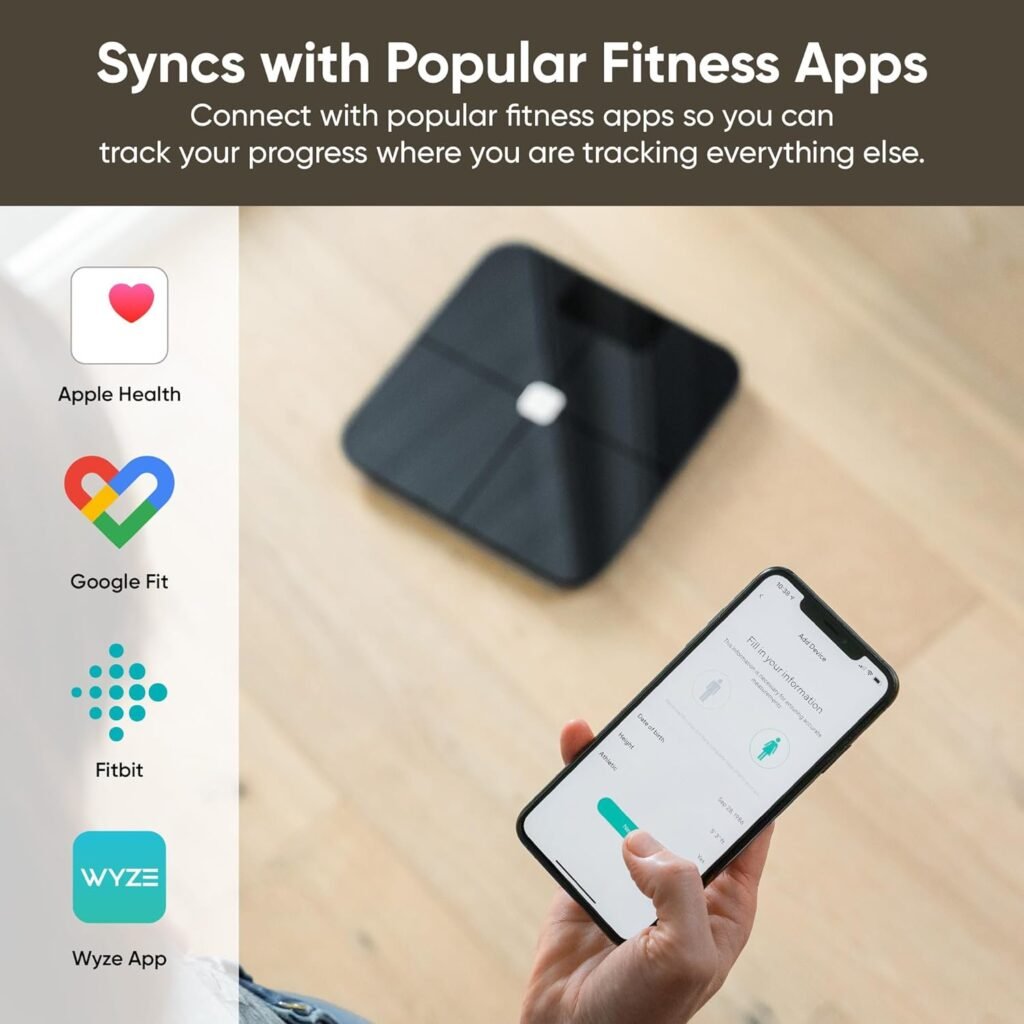


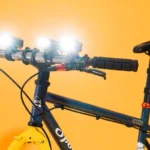 0
0
 0
0
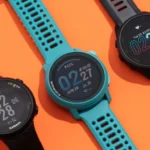 0
0
 0
0
 0
0
 0
0
 0
0
 0
0
 0
0